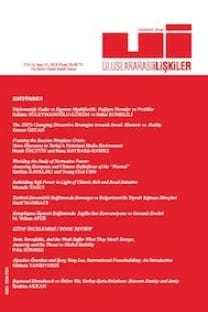Asimetrik Saldırı Savaşları, Siyaset ve Uluslararası Hukuk
Bu makalede, öncelikle, savaşların yol açtığı insanî felâketlerin savaşa ilişkin literatürde genelde göz ardı edildiği vurgulanmaktadır. Batı-dışı dünyaya II. Dünya Savaşı sonrasında büyük yıkım getiren ülke-içi ve uluslararası savaşların esas itibariyle iki sebebe bağlanabileceği belirtilmektedir: birincisi, “ulus”un âli çıkarlarını ve yüce ideallerini temsil eden ulus-devletçi yapılanma, ve bununla bağlantılı olarak, azınlıkları genel olarak dışlayan ulusçu söylem; ikincisi, emperyalist müdahaleler. Modern dönemde, ve hususiyetle 11 Eylül (2001) sonrasında, dünya barışına en fazla zarar veren gelişmenin “asimetrik saldırı savaşları” olduğu bu çalışma boyunca vurgulanmaktadır. Afganistan (2001), Irak (2003-) ve Lübnan'ı (Temmuz/Ağustos 2006) hedef alan işgal amaçlı askerî müdahalelerde gözlendiği üzere, bu tür savaşlarda hasım güçler arasında kuvvet muvazenesi bulunmadığı gibi, modern teknoloji sayesinde savaş ve onun yol açtığı korkunç yıkım “görünmez” kılınmıştır.
Anahtar Kelimeler:
İç Savaş, Asimetrik Saldırı Savaşları, Silahlı Saldırı, Realist Paradigma, İnsanî Müdahale.
Asymmetrical Wars of Aggression, Politics and International Law
This article at first emphasizes the failure of the literature on war to grapple with the humanitarian disasters caused by wars. It also argues that civil as well as international wars that have brought havoc to the non-Western world in the aftermath of the Second World War are essentially the result of two determining factors: first, the rise of political formations in the form of nation-states in Asia and Africa that are conceived as being the very embodiment of the high interests and exalted ideals of the "nation, " and, linked to this, a nationalist narrative that has too often precluded minorities; second, imperialistic interventions. The point is made throughout this article that asymmetric wars of aggression have figured as the greatest threat to world peace in the modern era, and, in particular, alter September 11 (2001). Waged between disproportionate powers, as in the case of US-led military occupation of Afghanistan (2001-) and Iraq (2003-) and the Israeli assault on Lebanon (July/August 2006), such wars, thanks to modern technology, have rendered "invisible" the act of war and the devastation that it brings.
Keywords:
Civil War, Asymmetrical Wars of Aggression, Armed Attack, Realist Paradigm, Humanitarian Intervention.,
___
- .....
- ISSN: 1304-7310
- Başlangıç: 2004
- Yayıncı: Uluslararası İlişkiler Konseyi Derneği İktisadi İşletmesi
Sayıdaki Diğer Makaleler
Muhteşem Ortaklık: Kant ve Clausewitz
Asimetrik Saldırı Savaşları, Siyaset ve Uluslararası Hukuk
Irak Savaşı bir 'Saldırı Suçu' mudur? İngiltere Lordlar Kamarası'nın bir Kararı
Rousseau'nun Savaş ve Barış Kuramı: Adalet Olarak Barış
